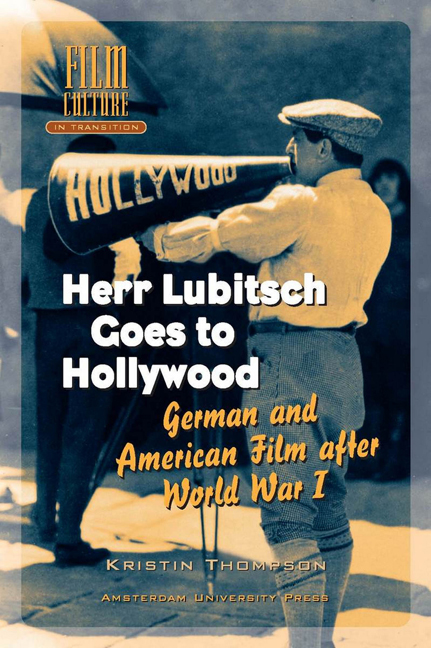Book contents
- Frontmatter
- Dedication
- Contents
- Acknowledgements
- Introduction
- Chapter One Lubitsch’s Career
- Chapter Two Making the Light Come from the Story: Lighting
- Chapter Three Subduing the Cluttered Background: Set Design
- Chapter Four Guiding the Viewer’s Attention: Editing
- Chapter Five Peeking at the Players: Acting
- Chapter Six Mutual Influences
- Epilogue: The Lubitsch Touch
- Notes
- Filmography
- Index
- Film Culture in Transition
- Plate Section
- Frontmatter
- Dedication
- Contents
- Acknowledgements
- Introduction
- Chapter One Lubitsch’s Career
- Chapter Two Making the Light Come from the Story: Lighting
- Chapter Three Subduing the Cluttered Background: Set Design
- Chapter Four Guiding the Viewer’s Attention: Editing
- Chapter Five Peeking at the Players: Acting
- Chapter Six Mutual Influences
- Epilogue: The Lubitsch Touch
- Notes
- Filmography
- Index
- Film Culture in Transition
- Plate Section
Summary
Lubitsch: The Filmmakers’ Filmmaker
In film-studies circles, Ernst Lubitsch is recognized as one of the great directors of world cinema, but the general public has long ceased to know his name. Even mentioning Ninotchka usually brings no responsive smile of recognition.
Filmmakers, however, still love Lubitsch. They apparently recognize in him not just one of the medium's premiere storytellers but a consummate master of every technical aspect of the cinema. Shortly after Lubitsch's death, Jeannette MacDonald said of him:
On the set, he had the greatness of his art, but no “artiness.” I have known so many directors who idealized him and styled some part of his work in their own careers. And to me, he was the greatest cutter in the business. Only Thanksgiving night he was talking of the lack of knowledge of cutting among some current directors. He cut as he worked on the set – that is, he shot just what he wanted. He visualized in the script the precise way he wanted it to work on the screen and I never knew him to be in trouble on a picture. He whipped his troubles in script. His scripts were almost invariably his pictures.
This sense of precision and mastery of the art of film recalls another great American master of the comic form, Buster Keaton.
The admiration has continued ever since. In the introduction to Peter Bogdanovich's collection of interviews he conducted over many years with most of the great Hollywood directors, he devoted a section to “The Director I Never Met” and wrote, “Lubitsch is also the one director whom nearly every other director I ever interviewed mentioned with respect and awe as among the very best.” Billy Wilder was fond of mentioning a sign he used for guidance: “For many years, I had that sign on my wall. HOWWOULD LUBITSCH DO IT? I would always look at it when I was writing a script or planning a picture. ‘What kind of track would Lubitsch be on? How would he make this look natural?’ Lubitsch was my influence as a director.” In 1998, Newsweek's special issue on movies included a claim by director Cameron Crowe that Lubitsch was still the model for makers of comedies.
- Type
- Chapter
- Information
- Herr Lubitsch Goes to HollywoodGerman and American Film after World War I, pp. 11 - 16Publisher: Amsterdam University PressPrint publication year: 2005



